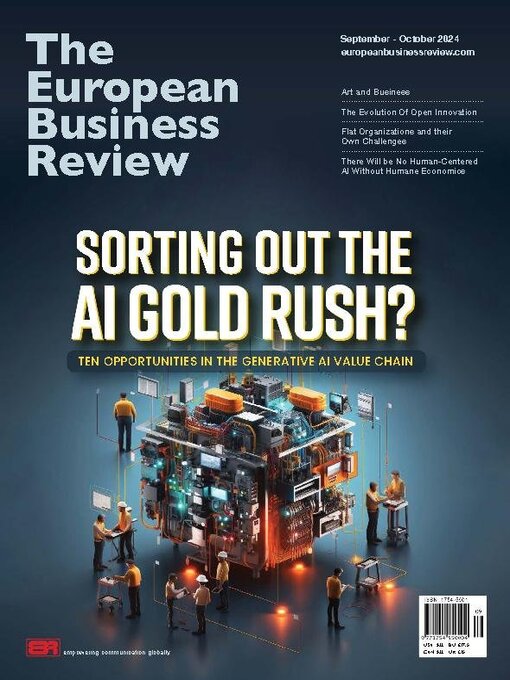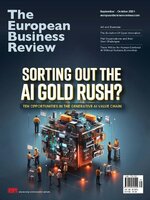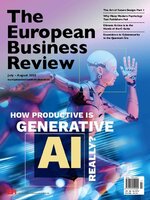The European Business Review is a leading business intelligence magazine designed to ensure that its readers make informed decisions. It provides them indispensable insight, current best practices and is their best source of new ideas about what’s important. The European Business Review readers embrace leadership in their jobs and their lives. Their affluence, education, achievements, and wide ranging experience are unparalleled. They are the men and women who shape the world we love, the world we live in.
CLOSE ENCOUNTERS of the 3D KIND • Once firmly in the province of specialists, 3D printing is now being brought closer to the rest of us, due to the pioneering efforts of printer manufacturers such as Elegoo. We spoke to co-founder Kevin Wang.
ART and BUSINESS • Art and business are typically seen as two different things. While art tends to be associated with beauty, inspiration, and a positive experience, business is often focused on entirely different issues such as profits, revenue and competition. Art goes with expression, and business with results.
2024 OLYMPIC AND PARALYMPIC GAMES: SPOTLIGHT ON URBAN LOGISTICS CHALLENGES • Sports mega-events lasting several weeks pose major logistical challenges, given the massive flow of people they generate, as demonstrated by the Paris Olympic and Paralympic Games. Innovative solutions implemented for the occasion, in terms of transport and the use of digital tools, helped to optimise supplies and reduce disruptions. From this viewpoint, the Paris experience could serve as a model for future improvements in urban logistics.
SORTING OUT THE AI GOLD RUSH? • Ten opportunities in the generative AI value chain
AUGMENTED OR DIMINISHED HUMAN INTELLIGENCE DUE TO AI? • Historically, many technological advances have been ‘unleashed’ on the world with scant attention paid to educating people on their use and, equally important, making them aware of their potential negative consequences. So, as we work to integrate AI into the fabric of our society, surely a great responsibility lies on the education sector.
Brain-Machine Synchrony: A NEW ERA OF AI-SUPPORTED HUMAN COLLABORATION AND SOCIETAL TRANSFORMATION • This paper introduces the concept of “brain-machine synchrony,” exploring the potential alignment of human brain waves and physiological responses with AI systems to build trust and enhance collaboration. Heightened physiological synchrony within human teams fosters improved cooperation, communication, and trust. Extending this phenomenon to human-AI interactions invites the hypothesis that aligning neural and machine processes could similarly enhance symbiotic partnerships. To support this thesis, we draw parallels between established examples of “collective cognition” in AI and well-documented neural synchrony facilitating human coordination. The burgeoning field of braincomputer interfaces offers a promising platform for more direct and nuanced communication between the human brain and AI systems.
THERE WILL BE NO HUMAN-CENTERED AI WITHOUT HUMANE ECONOMICS • Digital technologies, while enhancing efficiencies, can exacerbate environmental degradation. AI, despite its potential to support sustainable development, is not exempt from these concerns. It is time to create a new model, to agree that the economic value of any business should only be worth the value it creates for society.
THE EVOLUTION OF OPEN INNOVATION: THE TIME HAS COME TO ACHIEVE AND MEASURE RESULTS • In a world of continuous challenges, Open Innovation has become essential for companies, driving significant transformations and providing support during a period of crisis. It promotes Corporate Venturing and innovation, creating diverse value and stimulating new ventures. Effective KPIs are crucial to measure Open Innovation's impact on corporate culture, skills, and strategic alignment, ensuring...

 July/August 2025
July/August 2025
 May/June 2025
May/June 2025
 March/April 2025
March/April 2025
 January/February 2025
January/February 2025
 November/December 2024
November/December 2024
 September/October 2024
September/October 2024
 July/August 2024
July/August 2024
 May/June 2024
May/June 2024
 March/April 2024
March/April 2024
 January/February 2024
January/February 2024
 November/December 2023
November/December 2023
 September/October 2023
September/October 2023
 July/August 2023
July/August 2023
 May/June 2023
May/June 2023
 March/April 2023
March/April 2023
 January/February 2023
January/February 2023
 November/December 2022
November/December 2022
 September/October 2022
September/October 2022
 July/August 2022
July/August 2022
 May/June 2022
May/June 2022
 March/April 2022
March/April 2022
 January/February 2022
January/February 2022